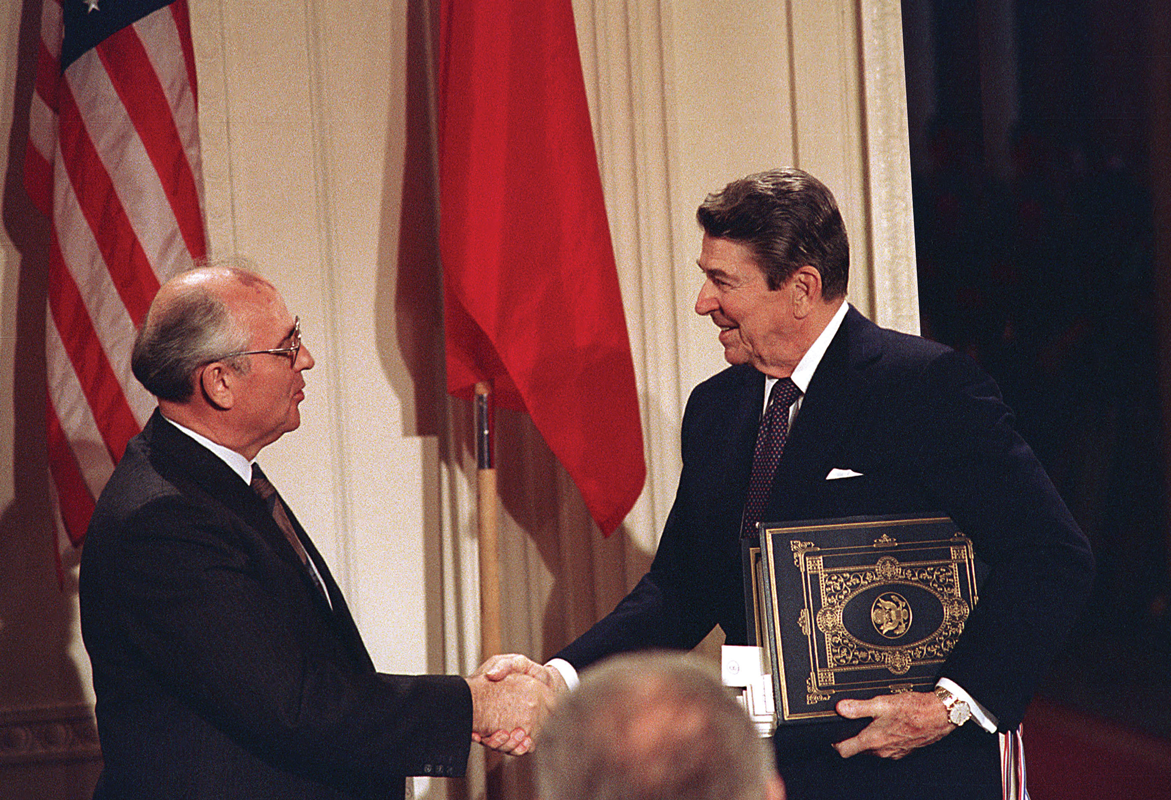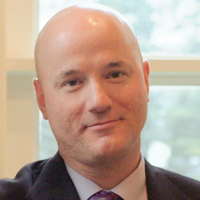Reexamining the End of the Cold War
On the 25th anniversary of the fall of the Berlin Wall, James Graham Wilson ’03, a historian at the U.S. Department of State, challenges many of the long-held assumptions about the end of the Cold War, and puts Russian President Vladimir Putin’s recent muscle-flexing into context.

This November marked the 25th anniversary of the fall of the Berlin Wall in 1989. That event served as a powerful symbol of the collapse of communism in Europe. Politicians and prominent academics alike have attributed the collapse to President Ronald Reagan and his administration’s strategic efforts to force the Soviet Union to surrender. But in his new book, The Triumph of Improvisation: Gorbachev’s Adaptability, Reagan’s Engagement, and the End of the Cold War (Cornell University Press, 2013), James Graham Wilson ’03, a historian at the State Department, contends that improvisation by Reagan and others, rather than grand strategy, helped to end the Cold War. In his role at the State Department, Wilson recently served on the Ukraine-Russia Coordination Team in the Bureau of European Affairs, where he says he observed “incredibly talented and dedicated Foreign Service and Civil Service officers in action”—including Jerome Sherman ’01, Sam Woodworth ’04, Riane Harper ’09, and Meghann Curtis ’01.
Here, he sheds light on how the Cold War stalemate really came to an end and reveals how post–Cold War conditions in Russia have contributed to current tensions between Russia and former Soviet-bloc countries.
The views expressed by James Graham Wilson do not necessarily reflect those of the Department of State or the U.S. government.
Robert Brigham: You’ve just had a wonderful book published by Cornell University Press, The Triumph of Improvisation. In it, you challenge many of the long-held theories about the end of the Cold War. Many foreign-policy experts believe that Ronald Reagan had a grand strategic outlook that purposefully made the Soviets spend money trying to combat the Strategic Defense Initiative, or that there was some kind of overall purpose and design in the Reagan administration to bring the Soviet Union to its knees. But you argue, I think persuasively, that there was a lot more improvisation and a lot more reaction and compromise and back and forth, especially between Reagan and the Soviet Union’s Mikhail Gorbachev, than most scholars have suggested. Can you say more about that?
James Graham Wilson: I think people will be surprised to find that, from the very start of his presidency, Reagan was trying to negotiate with Soviet leaders. He wrote letters to Brezhnev, Andropov, and Chernenko asking them to tone down the Cold War rhetoric—even as he spoke publicly about an “evil empire.” Indeed, throughout the course of his political career, Reagan was ambivalent about how ultimately to deal with communism and the Soviet Union. There was a tension between two ambitious goals: the eradication of communism and the abolition of nuclear weapons. This tension led to frustration, yet also produced very surprising results.
Reagan improvised. No one in 1981 would have anticipated that the president would turn the Strategic Defense Initiative [SDI] into a central tenet of national security policies. Even more astonishing would be the notion that in the end of 1986, Reagan would be discussing both with Gorbachev and with his own advisers the idea that the United States should share this missile shield with the Soviets as a sort of insurance policy to make sure both sides disarmed. I do not believe that Reagan’s ultimate intention, when it came to SDI, was to bankrupt the Soviet Union.
Brigham: So if there wasn’t a grand strategic plan, what guided the improvisation?
Wilson: Dynamics among Reagan’s top advisers were key. George Shultz became Secretary of State in the summer of 1982. He opposed “linkage.” For example: What happened in Afghanistan would not be linked to negotiations over missiles in Western Europe. A decade before, Henry Kissinger and Richard Nixon saw the Cold War as a grand chessboard in which everything was connected to everything else. Shultz developed an incredible bond both with Reagan and then with Gorbachev. The conversations in Moscow in April of 1987 show the Secretary of State speaking earnestly about how the Kremlin might improve the performance of the Soviet economy in response to the coming information age and advancements in biotechnology, among other things.

Brigham: It sounds as though Gorbachev was a willing partner in all of this.
Wilson: Very much so. The leading scholar on Russia and the Cold War, Vladislav Zubok, draws an apt comparison between Gorbachev and FDR, who was elected president in the middle of the Great Depression and was willing to do anything to save capitalism. Gorbachev in 1985 wanted to save communism. He had slogans—Perestroika, Glasnost, Common European Home, and New World Order—and forwarded them as grand ideas. I argue in The Triumph of Improvisation that these slogans did not contain a whole lot of substance, yet Gorbachev’s belief that they did led him to respond favorably to events on the ground in 1989, when the Berlin Wall came down.
We’re just coming up to the 25th anniversary of that event, and many will recall Ronald Reagan’s 1987 proclamation: “Tear down this wall!” Yet Gorbachev never gave an order to tear down the wall. Even if he had done so, it would not have been because of Reagan’s speech. In fact, Reagan’s greatest contribution to the events of 1989 occurred in the summer of 1988, when he stood in the middle of Red Square and declared that his “evil empire” statement referred to another time and era. I think those words reduced the Soviet perception of threat from the United States.
Brigham: So how did this relationship between Washington and Moscow in the declining years of the Cold War change fundamentally with George H. W. Bush?
Wilson: At the start of 1989, George Bush and his top advisers thought that Shultz and Reagan had focused too much on the romantic notion of abolishing nuclear weapons; they wanted to channel the focus of Soviet reforms to more practical matters, such as the status of Germany and Eastern Europe.
Secretary of State James Baker, along with his top advisers Robert Zoellick and Dennis Ross, started to think: What are the fundamental dynamics of the Cold War and how can we tackle them? Jack Matlock, who was Reagan’s top Soviet adviser and somebody for whom I have tremendous regard, has written that by the end of 1988, the Cold War was “all over except for the shouting.” I don’t think that that was the case. I think that the Bush administration identified that the fundamental components of the Cold War—which included the division of Germany and the overall division of Europe—were still in place. Bush subsequently managed his national security team through this rapid transformation of the post–World War II international order.
Brigham: Following the Cold War, the Clinton administration really played a rather significant role in helping Russia transition, created a climate that was conducive to better relations, and gave direct aid to Russia. I think that most foreign-policy watchers would say that relations between the United States and Russia were close and warm for a decade or two, but that certainly does not seem to be the case today. If we read the headlines, many people are saying that Putin is a throwback to the Cold War days. What’s your take on the problems in the Ukraine and the U.S.-Russia relationship today?
Wilson: When I was doing research at the Gorbachev Foundation, I encountered people my age and would try to explain that I was writing a dissertation about the end of the Cold War. They would respond with puzzled looks: “Why the end of the Cold War? The Cold War never ended.” That response is emblematic of an understanding of the Cold War as essentially an anti-Russia project that persisted beyond the collapse of the Soviet Union in 1991.
I do not subscribe to that thinking. The Clinton administration went to great lengths to improve U.S.-Russian relations and prevent the return of communism, which was a plausible scenario in the 1996 elections. The average American did not necessarily grasp conditions in Russia at the time, however. There are some really incredible polling statistics from the time: Americans, in 1998, I think, were asked whether they thought Russians were better off after communism, and the vast majority of Americans said, “Of course they are.” This was a moment at which Russia was suffering from an economic crisis worse than the Great Depression in the United States, and yet the perception was basically, “Well, at least they have freedom.”
Putin came to power at the end of 1999 and took steps to impose order and modernize the economy. In the aftermath of the 2007–2008 financial crisis, however, Putin has focused less on improving the lives of Russians and more on demonstrating that Russia remains a great power to be taken seriously in the world, and that he will oppose what he says is the encroachment of outside powers, particularly NATO, in the former Soviet states along its borders. There are significant populations of ethnic Russians there who, as Putin has said, woke up in 1991 to discover that they now resided in another country.
Brigham: How does his message—that Russia has to be taken seriously and that it will not tolerate NATO encroachment—resonate with ordinary Russians?
Wilson: Based on news reports, social media, and the accounts of friends who have traveled there, I think that, unfortunately, his actions in Crimea and elsewhere are popular at home.
Brigham: So it’s likely that Ukraine is not the last place where these ideas will be tested?
Wilson: One hears from the Kremlin talk of keeping Baltic countries off balance. There are frozen conflicts inside Moldova and the Caucasus region. These will be long-term challenges. But I am a long-term optimist.

Robert K. Brigham, the Shirley Ecker Boskey Professor of History and International Relations, has taught at Vassar College since 1994. He teaches courses on the history of U.S. foreign relations.
